EARLY YEARS FOUNDATION STAGE
Learning in the Early Years
The Foundation Stage is a distinct phase of Early Years education that takes place from when a child is born until they are five. At Wheatley Nursery School we follow the statutory Early Years Foundation Stage Framework 2021. This under pins all that we do. The EYFS Framework has seven areas of the curriculum. All the work that we do at Wheatley Nursery School is striving to support each child to reach their potential in each of these areas. The curriculum areas are split into:
Three Prime Areas:
- Personal, Social and Emotional development
- Communication and Language
- Physical Development.
And Four Specific areas:
- Mathematics
- Literacy
- Understanding of the World
- Expressive Arts and Design.
Follow the link to read the EYFS Statutory Framework 2021:https://assets.publishing.service.gov.uk/government/uploads/system/uploads/attachment_data/file/974907/EYFS_framework_-_March_2021.pdf
The curriculum at Wheatley Nursery School is underpinned by the non-statutory guidance development matters. This supports our planning and assessment of the children. If you would like to read the document please follow this link https://assets.publishing.service.gov.uk/government/uploads/system/uploads/attachment_data/file/1007446/6.7534_DfE_Development_Matters_Report_and_illustrations_web__2_.pdf
For more information about what to expect when, please click here fhttps://www.stswithunsprimary.org/Curriculum/Early-Years/What_To_Expect_When.pdf
This app is great for educational ideas to do at home https://50thingstodo.org/
Our Curriculum Intent
The skills and knowledge that we teach at Wheatley Nursery School are based in part on responding to the children’s interests and partly through core texts and topics that we feel are important for our children to ensure they have a rich and varied early childhood experience. Intentional Teaching: adult-focussed experiences are planned to offer children the opportunity to develop & extend their skills & knowledge by engaging with activities designed to introduce new provocations or to build on previous learning.
Here is our Curricular Aims
How we implement the curriculum
We have a child centred approach– we observe children with curiosity and patience and our interactions allow us to have a deep knowledge of children as individuals. We plan with each child in mind, tuning in to their individual interests. Each key person regularly shares their observations with parents and carers and encourages them to contribute, this forms a holistic view of the child.
We have play based learning opportunities through our continuous provision, within our exciting enticing learning environment we offer engaging, challenging learning
opportunities that support wellbeing and development. Children access the environment inside and outside , ‘free flowing’ throughout the session. Adults all understand the impact that quality interactions have on each child’s learning as they play, and resources inclusive and accessible to support deep level learning.
We have rich language opportunities through the ‘real’ experiences that we offer that provide opportunities to develop language skills. Our high quality interactions support rich language development. Our cultural capital opportunities are planned according to the individual’s needs and with language development in mind.
We form strong relationships from the outset with the child and their family. Each child has a key person, who supports the link between home and nursery, starting with a home visit. We have a strong professional team where we value each other’s strengths and contributions.
We are supportive to families as they come across challenges or hurdles in managing family life. We signpost families towards additional support as required, such as making Early Help referrals, identifying courses and support networks and ways in which they can support their child at home. We work closely with parents of children who have additional needs. Our strength in supporting families is that we make ourselves available to the families when they need us and we have a wealth of experience to draw upon.
We encourage curious, inquisitive children through offering an enticing varied learning environment. Through our ‘welly Wednesdays’ and a focus on outdoor learning the children are encouraged to ask questions and notice the environment around them. They are regularly provided with opportunities to explore the local environment and have hands-on experiences with real life objects.
Our Teaching and learning is based on children’s interests: we use a focus child observation cycle which includes discussion with parents about their children’s current interests and development; planning for children’s first & next steps in learning & links to home learning.
Intentional Teaching: adult-focussed experiences are planned to offer children the opportunity to develop & extend their skills & knowledge by engaging with activities designed to introduce new provocations or to build on previous learning.
Our curricular aims are adaptable to each child and are ambitious for all. We offer additional support and scaffolding to help every child to access the curriculum and to ensure they make progress through it.
Our curricular aims for all children this year are:
Communication and Language
To be confident to speak and express myself, however I communicate
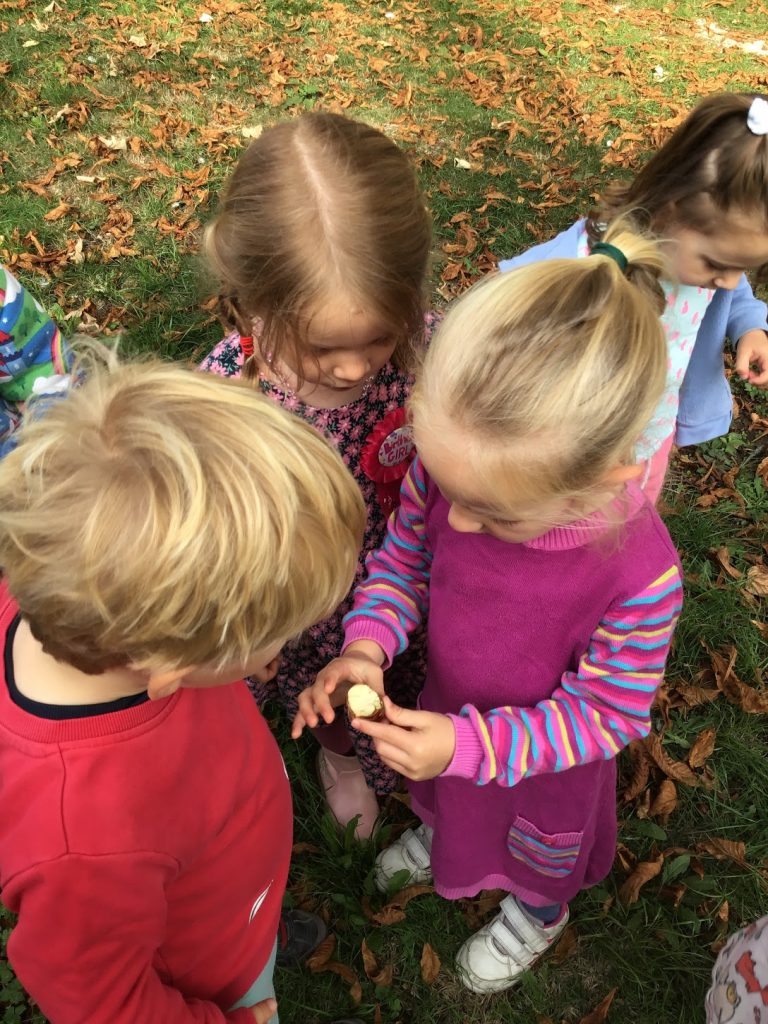
Personal,Social and Emotional Development
To become self-assured, thoughtful and empathetic members of the community
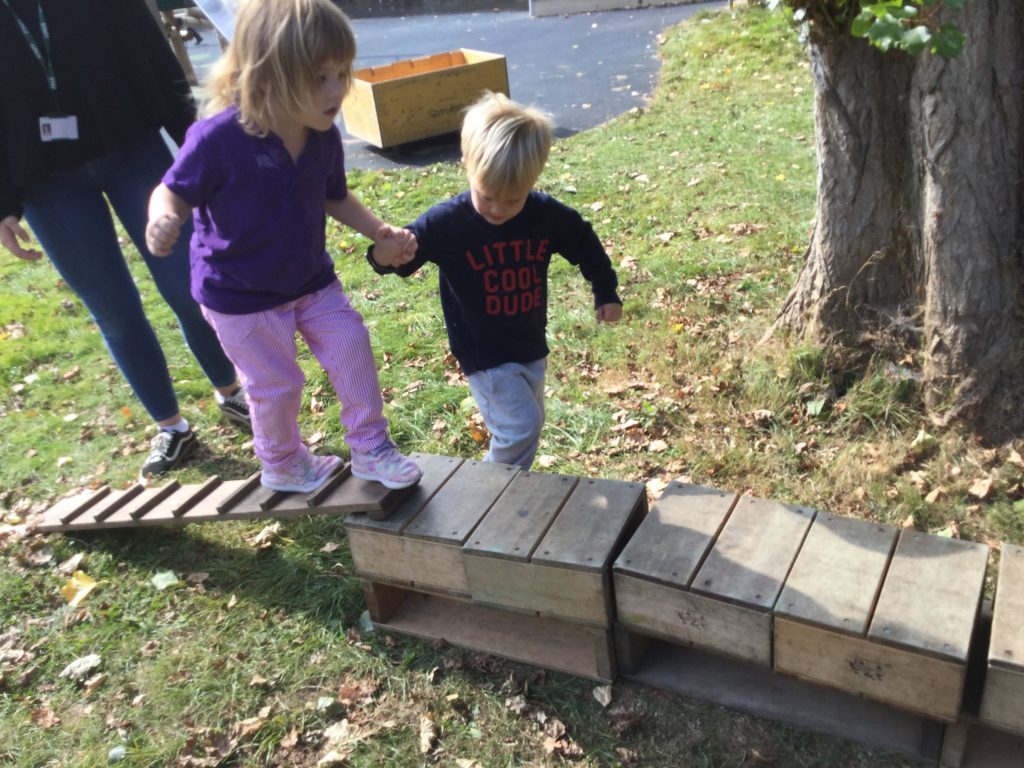
Physical Development
To be able to take sensible risks and to use a variety of tools and resources independently
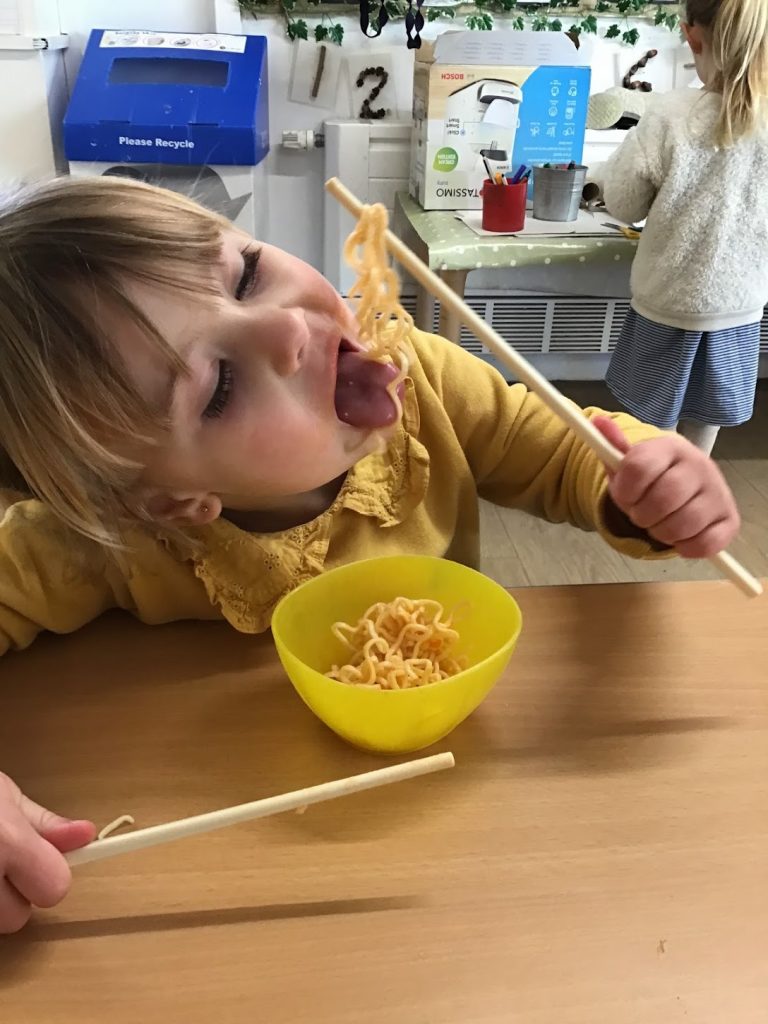
Literacy
To see themselves as readers and writers
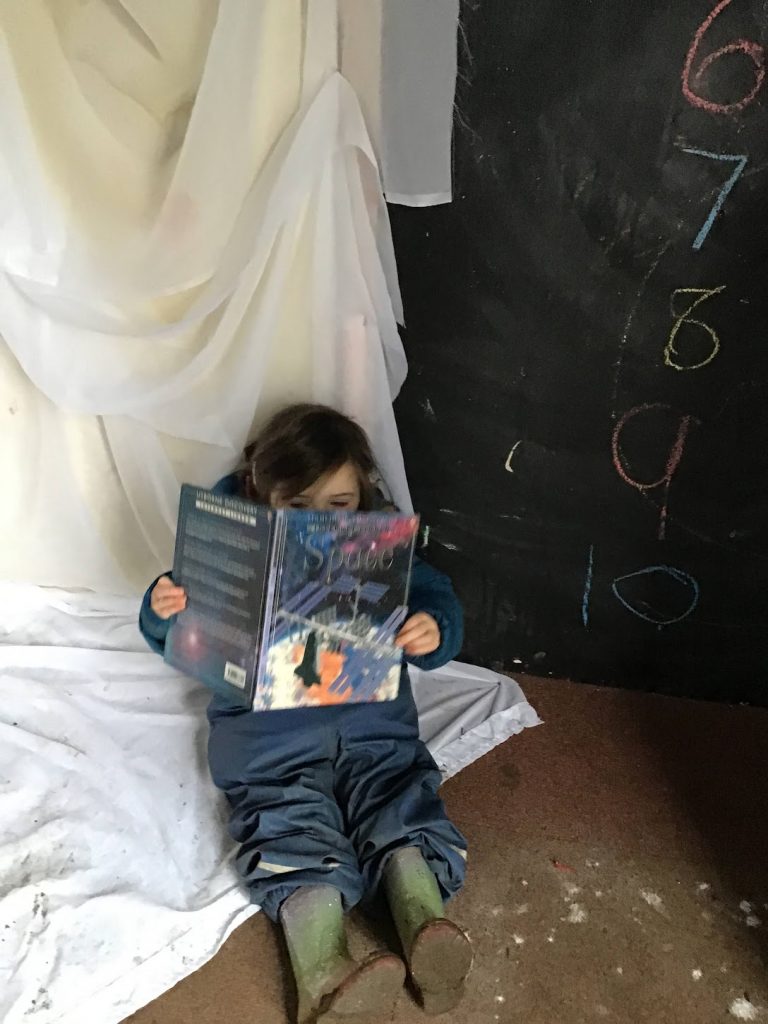
Mathematics
To problem solve and apply mathematical knowledge to everyday experiences
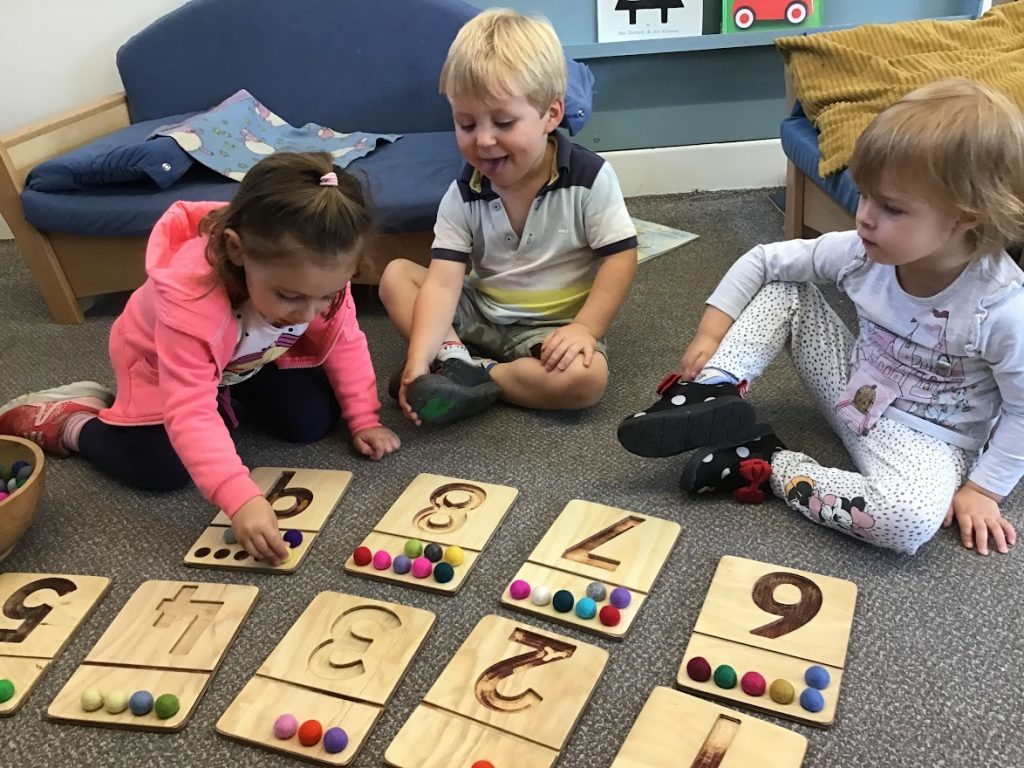
Understanding of the World
To explore the natural world with confidence and care
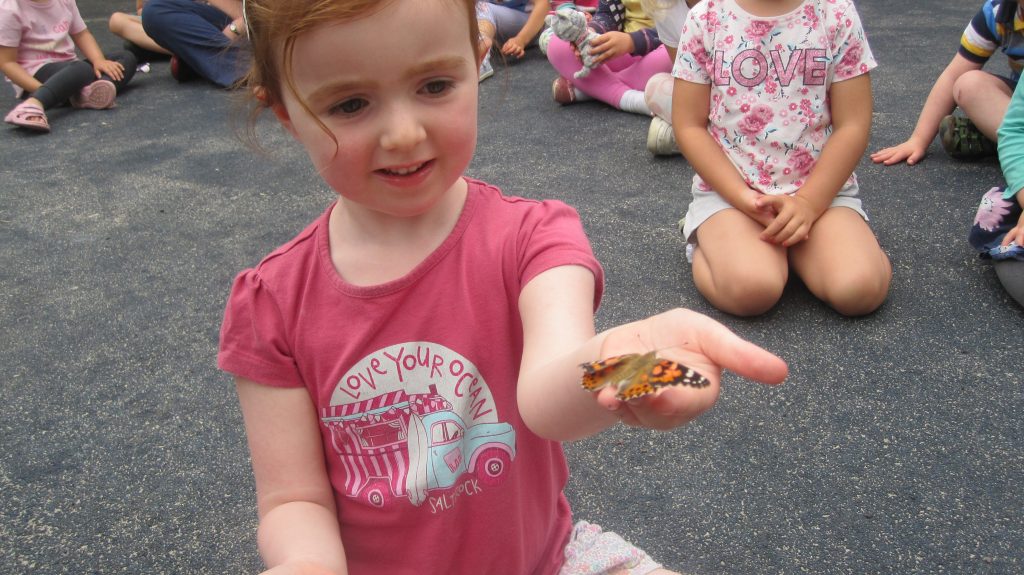
Expressive Arts and Design
To express myself freely and with pleasure using a variety of media

We offer regular learning opportunities based on:
- core story and maths story books (dialogic reading), poems and songs.
- core experiences: consistent learning areas (indoors and outdoors) which are carefully resourced and organised to promote high levels of involvement and provide inspiring starting points for high quality play and exploration and investigation. These include: art ,STEM, snack & cooking area; water play; sand play; malleable & tactile play; writing area; indoor book area & outdoor reading ,home corner; large & small-scale block & construction play;mud kitchen; indoor & outdoor maths equipment; small world play; gross motor play; music-making.
- Outdoor learning and Welly Wednesdays
- Opportunities to extend children’s cultural capital – these include: farm visits, walks into the local area to collect conkers, visit the shops , do traffic surveys.
EARLY YEARS FOUNDATION STAGE POLICY
Aims
This policy is intended to support and encourage staff in meeting the statutory requirements and in the delivery of high quality experiences for children’s learning and development. It is underpinned by the Statutory framework for the early years foundation stage 2021 (EYFS), a Government framework for children aged birth to five.
“Every child deserves the best possible start in life and the support that enables them to fulfill their potential. Children develop quickly in the early years and a child’s experiences between birth and age five have a major impact on their future life chances. A secure, safe and happy childhood is important in its own right. Good parenting and high quality early learning together provide the foundation children need to make the most of their abilities and talents as they grow up. (Statutory Framework for the Early Years Foundation Stage page 5 DFE 2021)
The EYFS has four guiding principles which shape our practice at Wheatley Nursery School
- Every child is a unique child
- Children learn to be strong and independent through positive relationships
- Children learn and develop well in enabling environments
- Children develop and learn in different ways and at different rates
A Unique Child
Child development
At Wheatley Nursery School we recognise that every child is a competent learner who can be resilient, capable, confident and self assured. We also recognise that each child develops in individual ways, at varying rates. Children’s attitudes and dispositions to learning are influenced by both their home background and feedback from others. We use praise and encouragement, as well as celebration/ sharing circle times and reward incentives, to encourage children to develop positive attitudes to learning.
Inclusive practice
We value the diversity of individuals within our school and do not discriminate against any child. All children and their families are valued and all our children matter.
Staff are skilled in supporting children with SEND,see the SEND policy for more information.
We aim to give each child every opportunity to become their best self. We do this by taking into account our children’s range of life experiences and what they know and can do when planning for their learning.
In the Wheatley Nursery School we set realistic and challenging expectations that meet the needs every child including those with special educational needs, children who are more able, children with disabilities, children from all social and cultural backgrounds, children of different ethnic groups and those from diverse linguistic backgrounds. We liaise closely with all relevant professionals in order to provide early support for those children and their families who need it.
We meet the needs of all our children through;
- Planning opportunities that build upon and extend children’s knowledge, experience and interests, and develop their self-esteem and confidence,
- Using a wide range of teaching strategies based on children’s learning needs,
- Providing a wide range of opportunities to motivate and support children and to help them to learn effectively,
- Providing a safe and supportive learning environment in which the contributions of all children are valued,
- Assigning a key person to each child who makes links with children’s home experiences through parents/carers,
- Using resources which reflect diversity and are free from discrimination and stereotyping,
- Planning challenging activities for children whatever their age and stage of development,
- Monitoring children’s progress and taking action to provide support as
necessary.
Keeping safe
It is important to us that all children feel ‘safe and are safe within the nursery school’. We help children become familiar with boundaries, rules and limits and how they can learn to take risks within a safe environment. Our children are allowed to take risks and are taught how to recognise, minimise or avoid hazards. We aim to protect the physical, emotional and psychological well being of all children. (See our Safeguarding Policy)
“Children learn best when they are healthy, safe and secure, when their individual needs are met, and when they have positive relationships with the adults caring for them.”
(Statutory Framework for the EYFS pg. 21 DFE 2021)
The EYFS has within it Safeguarding and Welfare Requirements. that the nursery school must meet. These include requirements to
- Promote the welfare and safety of children
- Provide each child with a key person
- Meet adult:child ratios of 1:14 for children aged 2 and 1:13 for children aged 3 and 4
- Provide healthy snacks and access to drinking water
- Promote good health, preventing the spread of infection and taking appropriate action when children are ill or have an accident
- Manage behaviour effectively in a manner appropriate for the children’s stage of development and individual needs
- Ensure all adults who look after the children or who have unsupervised access to them are suitable to do so
- Ensure all staff have access to regular Continuous Professional Development (CPD) and supervision
- Ensure that the premises, furniture and equipment are safe and suitable for purpose
- Ensure that every child receives enjoyable and challenging learning and development experiences tailored to meet their needs
- Maintain records, policies and procedures required for safe efficient management of the setting and to meet the needs of the children
Health and well-being
Children’s health is an integral part of their emotional, mental, social, environmental and spiritual well-being. We promote healthy snacks and offer foods from different cultures to develop their taste preferences. We provide children with access to fresh drinking water. Activities relating to the food cycle are interwoven in planning such as. planting seeds, gathering, preparing and eating! We ensure that children can rest during the day and have quiet areas indoors and places outdoors where children can relax alongside space for vigorous free movements.
Positive Relationships
Respecting each other
At Wheatley Nursery School we recognise that children learn to be strong and independent through forming secure relationships. We aim to develop caring, respectful, professional relationships with the children and their families.
Parents as partners
We recognise that parents and carers are children’s first and most enduring educators and we highly value the contribution that parents make. We recognise the role that parents have play in supporting their child/ren’s development. We do this through:
- Talking to parents about their child before they start in our school
- Offering visits to meet each child in their home prior to starting
- Offering parents regular opportunities to talk about their child’s development and progress and allowing free access to their child’s Learning Journal
- Encouraging parents to talk to their child’s key person about any concerns they may have
- Offering various activities throughout the year that involve parents and carers in the life of school for example, community events
- Supporting parents and carers whose first language is one other than English
Supporting learning
We believe effective teaching is routed in the child’s own interest and ideas and involves the child learning through play.
Effective teaching involves:
- Engaging and stimulating each child
- Regularly reviewing each child’s progress towards learning outcomes
- Varying what we provide to match children’s interests and needs
- Maximising opportunities for children to explore and learn in different ways including independently and in different sizes.
Routines are an important way that children feel secure and can make sense of all the opportunities offered throughout their time in school.
Our routines are structured yet flexible. Children play and learn through our continuous provision indoor and outdoor throughout their day where they are supported by different adults according to their needs and interests. We have small group time and whole group time providing adult -led activities.
Key person
At Wheatley Nursery School each child has a key person who knows the child and their family well. The key person builds confidence, gives children opportunities to express their thinking and use their initiative. We believe children learn and develop effectively when the key person provides:
- First-hand experiences
- Individual and collaborative learning experiences
- Appropriate pace
- An environment where children can take risks
- Innovative delivery
- Clear expectations
- Opportunities to review and reflect
- Emotional literacy scaffolding and development
- Thorough preparation and organisation
- Activities building on prior learning
- Open-ended, thought provoking challenging questions
- Support for children with differing needs
- Support for parents and carers
All staff involved with children in the EYFS aim to develop good and warm relationships, interacting positively with them and taking time to listen.
“The best kind of teacher is one who helps you do what you couldn’t do for yourself but doesn’t do it for you”
(Child aged 8, quoted in “Teaching Children to think” by Robert Fisher, Nelson Thornes 1990)
Enabling Environments
Observation, assessment and planning – supporting every child
At Wheatley Nursery School we recognise that the environment plays a key role in supporting and extending each child’s learning and development. This begins by observing the child and assessing their interests and needs, before planning challenging, but achievable, activities and experiences to extend their learning and development. We use high quality natural resources to enhance experiences and play. Assessment of their achievements helps us plan the next steps for the child and helps to ensure they make the appropriate progress.
Observation is key to planning an appropriately challenging and exciting curriculum.
The recording of observations is practicable, organized and well-managed. We use Tapestry, an online learning journey to record observations of a child’s milestones in their learning. The Oxfordshire Early Years Development Tool is used three times a year to assess whether a child is inline with their age related milestones or not and to track progress. We use information provided by the child’s key person, other practitioners, parents and other professionals where appropriate.
We hold weekly planning meetings to enable all staff to contribute towards each child’s learning and development, based on their observations. Children also play an important part in planning their own learning.
Our planning is responsive to children’s interests and fascinations. It identifies curiosity through books and songs, also highlighting vocabulary development.
Long term planning
In our school we use themes appropriate to the interests of our cohort of children and the community to which they belong and review these annually. We also plan for continuous provision. This is a core range of resources that children can use each day throughout the school year.
Medium Term Planning
Our medium-term plans can run for a few weeks, month or half termly and are based on the needs and interests of the children for all areas of learning and development. Planning details the focus for learning and gives an overview of possible enhancements to continuous provision, the adult focused activities, resources, display and visits/visitors to school. Often themes are used as a vehicle for delivery.
Short term planning
These are written in alternate weeks and detail the adult focused and child-initiated learning experiences. It outlines the elements of development, effective learning for children and details prompts for staff linked to observation as well as key language/questions and resources.
Evaluations and next steps determine our planning for subsequent weeks. Grouptime planning reflects short term planning for children with Special Educational Needs or disability linked to their SEN Outcomes Plan, EHC and Individual Learning Plan Personal Education Plan (PEP) or for children we care for (CWCF) linked to their Personal Education Plan (PEP) where appropriate.
Each week the key person plans for a differentiated phonics, maths and personal social emotional group time.
Assessment
Staff’s on-going assessments form the basis for gathering holistic information on pupil progress. This information is analysed termly and highlights areas for future development. We also work with parents during the year to promote ‘School Readiness’ which focuses on some basic skills and emotional readiness to learn in a primary school environment.
Assessments are made on entry to nursery within 6 weeks, mid year and at the end of the year. In little windmills the 2 year old summary report is written after 6 weeks in the first term.
The learning environment
A high quality environment is key to success. It is the shared responsibility of staff and children to care for the environment both indoors and outdoors. Staff take pride in developing areas of continuous provision and displays which enhance and broaden opportunities.
The EYFS learning environment is organised to allow children to explore and learn securely and safely indoors and outdoors. There are areas where the children can be active, be quiet and rest. The environment is organised into continuous provision areas, where children are able to find and locate equipment and resources independently. Our outdoors provision offers opportunities for doing things in different ways and on different scales than when indoors. It offers our children the opportunity to explore, use their senses and be physically active and exuberant.
Learning and Development – Characteristics of Effective Teaching and Learning
Play and exploration
At Wheatley Nursery School we recognise that children learn and develop in different ways and at different rates. They develop their skills through a variety of processes. These include:
- Investigation
- Experimentation
- Listening
- Observing
- Talking and discussing
- Asking questions
- Practical exploration and role play
- Retrieving information
- Imagining
- Repetition
- Problem solving
- Making choices and decision-making
- Making predictions
We use the ‘Characteristics of Effective Teaching and Learning’ to shape our practices. The EYFS sets out three characteristics of effective teaching and learning. These are:
- playing and exploring- children investigate and experience things, and ‘have a go’
- active learning- children concentrate and keep on trying if they encounter difficulties, and enjoy achievements
- creating and thinking critically – children have and develop their own ideas, make links between ideas, and develop strategies for doing this.
We provide opportunities for children to become engaged, motivated and to think critically. Through play our children explore and develop learning experiences, which help them make sense of the world. They practice and build up ideas, and learn how to control their behaviour and understand the need for rules. They have the opportunity to think creatively alongside other children as well as on their own. They communicate with others as they investigate and solve problems. They can express fears or re-live anxious experiences in controlled and safe situations.
Active learning occurs when children are motivated and interested. This happens best when children have some independence and control over their learning. As children develop their confidence they learn to make decisions. It provides our children with a sense of satisfaction as they take ownership of their learning. Children’s learning is extended through accessing resources freely and being allowed to move them around our school.
Children are given the opportunity to be creative through all areas of learning and development, not just through the arts. Staff support children’s thinking and help them to make connections by showing genuine interest, offering encouragement, clarifying ideas and asking open- ended questions.
Areas of Learning and Development
The EYFS sets out seven areas of learning and development set out as prime areas,
There are three prime areas (particularly important for building a foundation for igniting chuildrens’ curiosity and enthusiasm for learning, forming relationships and thriving):
- Communication and Language
- Physical Development
- Personal, Social and Emotional Development
There are four specific areas which require more direct teaching and through which the prime areas are strengthened and applied. The specific areas are:
- literacy
- mathematics
- understanding the world
- expressive arts and design
None of these areas can be delivered in isolation from the others. They are equally important and depend on each other. All areas are delivered through a balance of adult focused and child initiated activities. In each of the seven areas there are Early Learning Goals (ELGs) that set out the expectations for most children to reach by the end of the EYFS (end of the reception year). We plan our intentions, implement and review the impact as part of our two weekly planning cycles. Each cohort of children may have very different needs and we plan according to that need, having high aspirations for all children.
Children are taught how to use all resources safely through focused activities. The adult’s role within continuous provision areas encourages our children to interact with resources and the environment with care and respect; and with regard for health and safety. We offer a range of resources both natural and man-made. We have a range of multi-sensory, multicultural and non-stereotypical resources which are reviewed and replenished regularly.
Transition
Each family is offered a home visit before starting in little windmills or nursery school. Parents are encouraged to have settling in visits with their parents before they start.
Wheatley Nursery School staff work closely with feeder schools to ensure a smooth transition. This includes transition meetings, small group visits and additional nurture visits for those children who require
